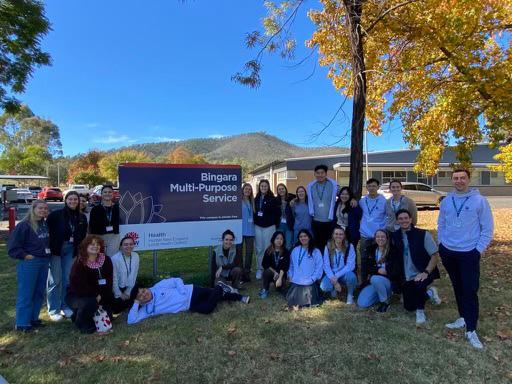
2 minute read
MEDICAL AND HEALTHCARE STUDENTS ‘GO RURAL’ IN BINGARA
Twenty medical and healthcare students from across NSW recently travelled through the New England area on a road trip designed to encourage future doctors, nurses and other allied health professionals to consider the benefits and rewards of a rural health career.
The second of this year’s four-day ‘Go Rural’ road trips, hosted and funded by NSW Rural Doctors Network (RDN), incorporated GP practice and hospital visits, clinical activities, community events, social functions and cultural visits in towns including: Quirindi, Narrabri, Bingara, Inverell, Glen Innes, Armidale, Tenterfield and Tamworth.
Advertisement
Research published in the Medical Journal of Australia shows rural exposure during medical training has been associated with an increased likelihood of medical students entering rural practice following graduation.
RDN Future Workforce Project Lead Eleanor Knight says Go Rural provides students with unique and valuable experiences in the towns they visit and the rewarding rural health careers on offer.
“Since 2019, RDN’s annual ‘Go Rural’ road trips have provided over three hundred students with opportunities to experience the benefits of working and living in rural communities. Allied health, nursing and medical students receive valuable first-hand insights into what their professional and day-to-day life could look like and how rewarding it can be. The students get to meet a range of health professionals, as well as community leaders, showcasing the importance of building connections within the communities.
“These trips have encouraged many students to choose a career in rural health as they are drawn to the beautiful landscapes, opportunities for adventure and the real sense of community in rural NSW. In addition to ‘Go Rural’, RDN offers a number of scholarships and opportunities focusing on attracting and building a larger and more sustainable workforce in remote, rural and regional communities”.
“Now more than ever the health of our rural communities is dependent on the successful recruitment and retention of enthusiastic and dedicated health care professionals who are such a valued and integral part of their local communities.”
Lawrence Wong is a second-year nursing student interested in working in a rural setting because of the opportunity it provides to work in an environment where nurses and healthcare workers are more than just providers of medical care – they also play an important role in the community.
“Rural healthcare providers are not just there to diagnose and treat illnesses but are often involved in health promotion, education, and advocacy. They work in close-knit communities and often have more autonomy and responsibility than their urban counterparts with the opportunity to work in a variety of clinical settings, from primary care clinics to emergency departments. These experiences can help to develop clinical skills that are not always available in urban settings.”
Jamilla Smith is a final year speech pathology student who grew up in Balranald and is awaiting an offer for post-graduate medicine.
“There are numerous reasons that I am interested in rural practice including my experiences living rurally, my rural placements as a speech pathology student, my values as a queer person, my career ambitions as an aspiring doctor and experience working under the NDIS as a disability support worker.”
“By working in rural practice I’d like to bring services to a small community that would not otherwise exist. As a lesbian woman with strong feminist values and a background in disability work and family violence, I hope to work in sexual health as a doctor and provide care to the LGBTQIA+ community. These services are extremely rare in remote communities and people often need to travel hours to access sexuality and gender affirming healthcare.”







